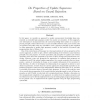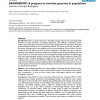1686 search results - page 82 / 338 » Programs as polygraphs: computability and complexity |
111
click to vote
TPLP
2002
14 years 11 months ago
2002
In this paper, we consider an approach to update nonmonotonic knowledge bases represented as extended logic programs under the answer set semantics. In this approach, new informat...
115
click to vote
PLDI
2012
ACM
13 years 2 months ago
2012
ACM
While graphics processing units (GPUs) provide low-cost and efficient platforms for accelerating high performance computations, the tedious process of performance tuning required...
ACSAC
2010
IEEE
14 years 10 months ago
2010
IEEE
Leakage of confidential information represents a serious security risk. Despite a number of novel, theoretical advances, it has been unclear if and how quantitative approaches to ...
111
click to vote
GECCO
2007
Springer
15 years 6 months ago
2007
Springer
An agent population can be evolved in a complex environment to perform various tasks and optimize its job performance using Learning Classifier System (LCS) technology. Due to the...
BMCBI
2008
15 years 18 hour ago
2008
Background: There are several situations in population biology research where simulating DNA sequences is useful. Simulation of biological populations under different evolutionary...


